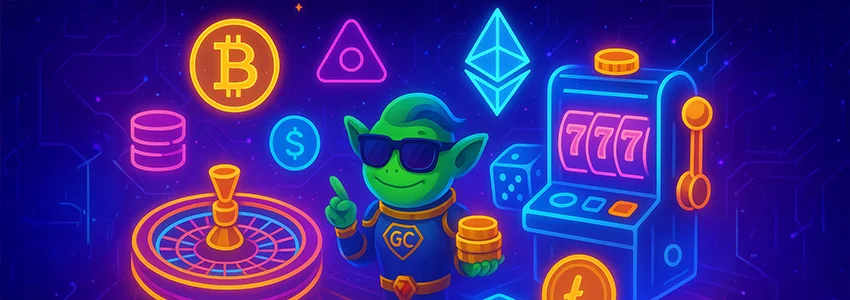Home > Casino Lab > Casino Web3 > Cryptocurrency in Casinos: Benefits and Risks for Players
Cryptocurrency in Casinos: Benefits and Risks for Players
The adoption of cryptocurrency in online casinos is one of the most significant shifts in the iGaming industry over the past decade. Bitcoin, Ethereum, and stablecoins are no longer niche assets reserved for tech enthusiasts; they have become widely accepted methods of payment across gambling platforms.
For players, crypto brings the promise of faster transactions, greater privacy, and global accessibility. However, like any innovation, it also comes with challenges that must be carefully understood. The question every gambler must ask is: do the benefits outweigh the risks?

The Benefits of Using Crypto in Online Gambling
One of the most compelling advantages of cryptocurrency in casinos is speed. Traditional payment methods often involve delays—bank transfers can take days, and even credit card withdrawals may require verification. With crypto, deposits and withdrawals are nearly instant, processed directly on the blockchain without intermediaries.
Another major benefit is privacy. Players who use cryptocurrency do not need to disclose sensitive banking details, reducing the risk of identity theft or financial fraud. Instead, all transactions are tied to wallet addresses, allowing for a higher degree of anonymity.
Cryptocurrency also makes online gambling borderless. Players from regions with limited access to banking or restricted gambling markets can bypass traditional barriers and access casinos worldwide. Combined with lower fees compared to credit cards or e-wallets, crypto gambling has become a preferred option for tech-savvy players.
The Risks of Cryptocurrency Gambling
Despite its advantages, crypto in casinos is not without risks. The first concern is volatility. The value of Bitcoin or Ethereum can fluctuate dramatically within hours, meaning that winnings today may be worth far less tomorrow. Stablecoins attempt to solve this problem, but they are not yet universally adopted.
Another risk lies in regulatory uncertainty. Many jurisdictions have not established clear rules for cryptocurrency gambling, creating legal gray areas that may affect both players and operators. Casinos operating without licenses can take advantage of this uncertainty, putting users at risk of scams or unfair practices.
Finally, crypto transactions are irreversible. While this ensures security against chargeback fraud, it also means that if a mistake occurs—such as sending funds to the wrong wallet—there is no way to recover the money. This adds an extra layer of responsibility for players.
Striking the Balance
Despite their potential, NFTs in iGaming also face significant skepticism. Many players perceive them as a superficial marketing strategy designed to cash in on hype rather than enhance gameplay. Without genuine utility, NFT-based promotions risk alienating users who see little value in owning a digital token that does not provide meaningful advantages.
Moreover, the volatility of the NFT market raises concerns, as the value of these assets can fluctuate wildly. Coupled with environmental critiques of blockchain technology and regulatory uncertainty, NFTs could easily be dismissed as a distraction if casinos fail to integrate them in ways that truly enhance the player experience.
The Future of Crypto Casinos
Looking ahead, cryptocurrency is likely to become a standard payment option in online casinos. As regulation evolves and mainstream adoption grows, we can expect more casinos to accept Bitcoin, Ethereum, and a wider range of stablecoins. Beyond payments, blockchain could enable crypto-native games, provably fair systems, and community-driven gambling platforms.
By 2030, cryptocurrency may not just be an alternative—it could be the default currency of online gambling.
Conclusion
Cryptocurrency offers players faster payments, enhanced privacy, and access to casinos without borders. Yet it also carries risks, from volatility and regulation to the irreversible nature of transactions.
For players willing to embrace innovation while practicing caution, crypto can enhance the gambling experience. For operators, it represents an opportunity to attract the next generation of players and redefine the future of iGaming.
The bottom line: cryptocurrency in casinos is not just a payment option—it is a new way of thinking about gambling itself.

